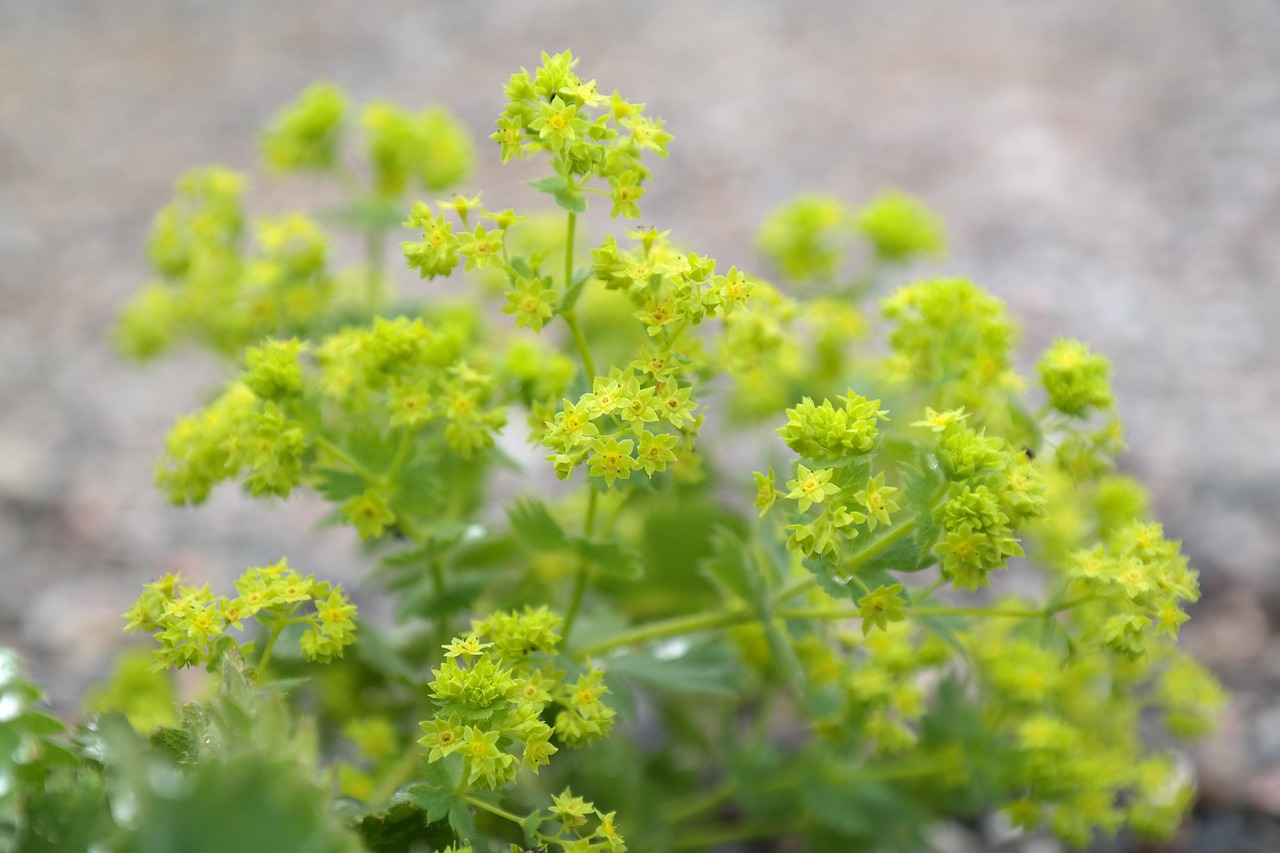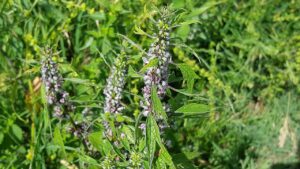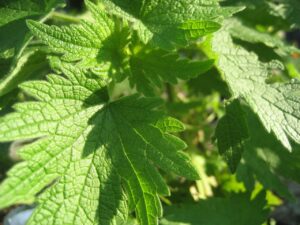Motherwort
Overview
Motherwort, or Leonurus cardiaca, is a traditional herb with a history of supporting heart and women’s reproductive health. Noted for its calming effects, it is recognized for various therapeutic properties, although its bitter taste is quite pronounced. Smoking motherwort for relaxation has been mentioned anecdotally, but information on this practice is not widely documented.
Common name(s): Lion's tail, lion's ear, throw-wort, and heartwort.
Scientific name: Leonurus cardiaca L.

Characteristics
Known for its cardiac tonic properties, calming effects on the nervous system, and support for women’s reproductive health.
Region
Native to Asia and Southeastern Europe, naturalized in North America.
Natural Habitat
Commonly found in fields, along roadsides, and in waste areas.
Cultivation
Prefers partial shade or full sun, moderate watering, and well-drained soil with a preference for loamy or slightly clay-rich substrates.
Traditional Usage
Motherwort has been esteemed for its healing properties, especially regarding heart health and women’s reproductive issues. In the realms of traditional medicine, this herb’s uses were highly regarded for:
- Aiding in the health of the heart.
- Alleviating menstrual discomforts.
- Serving as a sedative to help with sleep or anxiety.
- Acting as a tonic for general wellbeing.
While scientific research offers support for some of these applications, it’s important to always consult with a healthcare provider before incorporating motherwort, or any new herb, into your wellness routine2. Remember that traditional uses do not guarantee safety or effectiveness for everyone, and the quality and preparation of the herb can greatly influence its impact.
Historical Usage
Used traditionally for heart conditions and women’s reproductive health issues, serving as a sedative and tonic in various cultures.
Common Usage
Currently used as a sedative, cardiac tonic, and to support women’s reproductive health.
Effects
Motherwort has long been revered for its various therapeutic properties, supported by both traditional use and modern scientific research. This herb provides a multitude of benefits that target the nervous and cardiovascular systems and addresses certain women’s health issues:
- Calms the nervous system, serving as a natural sedative to promote relaxation and reduce stress.
- Functions as a cardiac tonic, supporting heart health by possibly aiding in the management of heart rhythm disorders and tension-related heart issues.
- Alleviates symptoms associated with women’s reproductive health, including menstrual irregularities and menopausal symptoms, due to its emmenagogue properties.
While motherwort’s efficacy and safety have been recognized, it is important to consult healthcare professionals, especially when managing specific health conditions. Exercising caution and following proper dosing guidelines can optimize the benefits of this herb2. While motherwort’s bitter taste might be off-putting for some, its medicinal virtues have maintained its popularity as a worthwhile herbal remedy.

Motherwort soothes the nervous system, fortifies cardiac wellness, and offers relief from menstrual and menopausal symptoms.
Effects when smoking
Smoking motherwort can provide a distinct experience with effects that differ from traditional consumption methods like teas or tinctures. It’s important to note that scientific research is limited in this area, and most of the information comes from anecdotal sources. Nevertheless, those who smoke motherwort report several effects:
- Mild Relaxation: Users often describe a sense of calm that comes over them, which may be due to the herb’s sedative properties.
- Nervine Effects: The potential soothing effect on the nervous system could be beneficial for those looking to reduce stress.
- Heart Health Support: Just as it’s traditionally used for heart conditions, some users feel it enhances heart wellness when smoked.
- Menstrual Relief: There are reports of motherwort helping to ease menstrual symptoms, though evidence is predominantly anecdotal.
- Bitter Taste: When smoked, the herb’s inherent bitterness can be off-putting to some, potentially impacting the overall experience.
While the idea of smoking motherwort might appeal as an alternative to more common consumption methods, it is essential to approach with caution. Always consider the potential risks associated with smoking herbs and consult with a healthcare provider, especially if you have existing health concerns or are on medication. Pregnant women, in particular, should steer clear of motherwort due to its uterine-stimulating effects4. The legal status is generally not a concern, as motherwort is legal in most places and sold as a supplement in the United States. However, always stay informed about local regulations regarding herbal substances.
Flavor Profile
Incredibly bitter taste.
Edible Parts
This plant is not known to be edible.
Effects when Smoked
Smoking may lead to a mild relaxing effect based on anecdotal evidence.
User Experiences
User experiences with Motherwort vary, with some noting a calming effect and relief from menopausal and menstrual discomfort, despite its strong bitter taste.
Medicinal Benefits
Motherwort has been valued in traditional medicine for its multiple potential health benefits. This herb is primarily known for its soothing properties that may support the heart and nervous system. Below are the potential medicinal benefits of motherwort:
- Acts as a cardiac tonic, potentially enhancing heart health2.
- Offers a sedative effect, helping to calm the nervous system2.
- Supports women’s reproductive health, including easing symptoms of menstrual and menopausal discomfort4.
It’s important to note that while some benefits of motherwort are supported by scientific literature, further research is necessary to understand the full extent of its effects. Additionally, individuals should consult with a healthcare provider before using motherwort, especially those who are pregnant or on medication, due to possible side effects and interactions4.
History and Folklore
Motherwort has long been valued in traditional medicine, spanning multiple cultures for its use in treating heart conditions and female reproductive issues. Recognized for its calming and tonic properties, it has held a place in folk medicine as a natural remedy. Often associated with sedative qualities, motherwort has been a go-to herb for those seeking relief from stress and anxiety, lending support to heart health and providing a soothing presence in the realm of women’s wellness. Historical application highlights motherwort’s pivotal role in ancient healing practices, where it was as much a staple in the healer’s kit as it was in the home apothecary.

Motherwort, treasured in herbal folklore, renowned for heart health and women's healing.
Side Effects and Contraindications
Side Effects and Contraindications of Motherwort
Motherwort is generally considered safe for many people. However, like all herbs, there are possible side effects and contraindications to be aware of:
- Uterine Stimulation: Motherwort may stimulate the uterus; thus, it is not recommended for pregnant women.
- Allergic Reactions: Although rare, those allergic to plants in the Lamiaceae family should be cautious.
- Interactions with Medications: Motherwort can potentially interact with cardiovascular medicines and sedatives.
- Gastrointestinal Discomfort: Some users may experience stomach upset when consuming motherwort.
Always consult with a healthcare provider before incorporating motherwort or any new herbal remedy into your regimen, especially if you have pre-existing health conditions or are taking medications.
Legal Status
Motherwort is legal in many countries worldwide and is sold as a dietary supplement in the United States. While the herb is generally accepted for its traditional use, it’s important to stay updated with local legislation as the legal status of herbal supplements can vary. Before cultivating or using motherwort at home, confirm that it aligns with regional policies. Remember that legal frameworks might change, and it is your responsibility to be informed about current laws in your area.
Always check with appropriate authorities if you’re uncertain about the legal status of motherwort in your location.
References
1. “Motherwort Monograph – Herbal Academy.” Herbal Academy. https://theherbalacademy.com/motherwort-monograph/
2. “Phytochemical and Psychotropic Research of Motherwort.” National Center for Biotechnology Information. https://www.ncbi.nlm.nih.gov/pmc/articles/PMC7911030/
3. “Motherwort: 5 Benefits, Dosage, & Safety.” The Botanical Institute. https://botanicalinstitute.org/motherwort/
4. “What Is Motherwort? Benefits, Side Effects, and Dosage.” Healthline. https://www.healthline.com/nutrition/motherwort
5. “Motherwort | Integrated Crop Management.” Iowa State University. https://crops.extension.iastate.edu/encyclopedia/motherwort
Image Credit: Hans
Image Credit: SanduStefan
Image Credit: nanseaj
Nicolas Duval
Nicolas is a passionate advocate for nature and the art of wildcrafting. His dedication shines through in Wildcraftia, a website he meticulously crafted to serve as a haven for nature enthusiasts worldwide. Driven by a deep appreciation for nature’s connection to humanity, Nicolas embarked on his journey in 2011 with SmokableHerbs, a platform showcasing his love for nature’s bounty. Building upon this foundation, he established Smokably, a thriving online store offering premium herbs and blends to a global audience.
